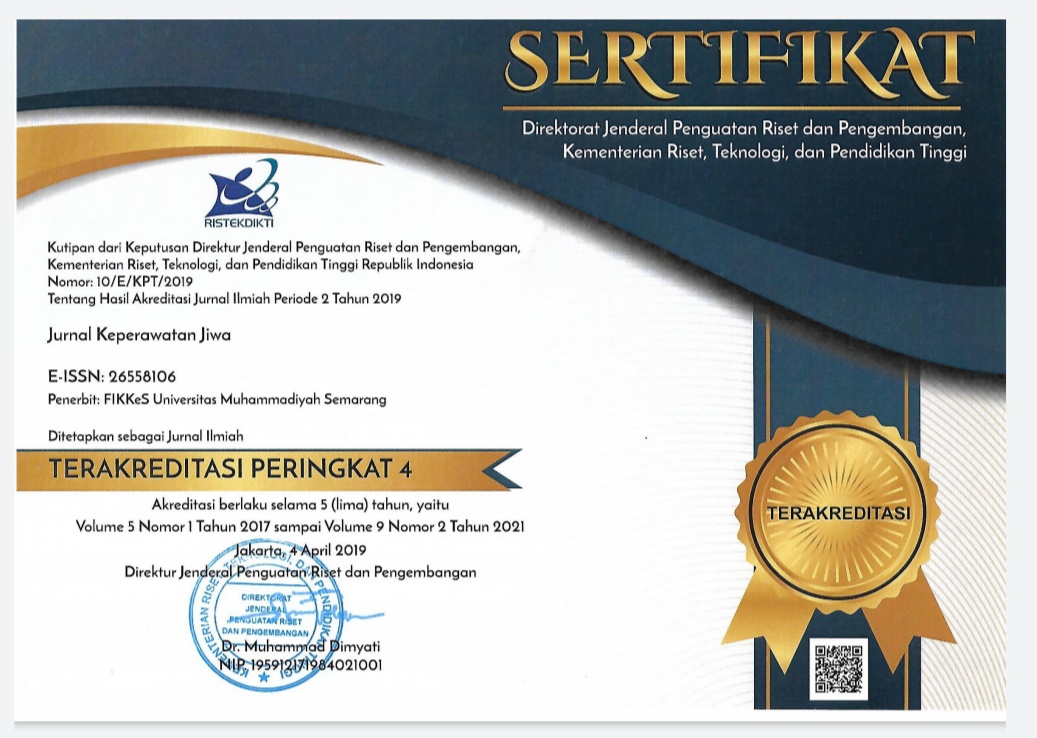GAMBARAN DISTRESS PADA PENDERITA DIABETES MELLITUS
(1)
(2)
(*) Corresponding Author
Abstract
Diabetes Mellitus (DM) merupakan salah satu penyakt kronis yang berpotensi mengalami komplikasi lebih berat seumur hidup pasien. Hal inilah yang menyebabkan banyak penderita DM mengalami distress. Distress yang dialami oleh pasien ini disebabkan oleh berbagai faktor penyebab dan berbagai respon pasien terhadap penyakitnya. Penelitian ini bertujuan untuk mengetahui bagaimana gambaran distress pada penderita DM. Penelitian dilakukan dengan metode deskriptif kuantitatif selama bulan Januari-Agustus 2018. Sampel sejumlah 44 penderita DM tipe II diambil secara accidental sampling di RS PKU Muhammadiyah Yogyakarta dan RS PKU Muhammadiyah Bantul. Instrumen penelitian menggunakan rekam medik dan kuesioner. Analisis hasil menggunakan program statistik komputer, dengan melihat distribusi frekuensi masing-masing domain. Hasil penelitian sebagian responden mengalami diabetes distress tingkat rendah (50%), 45,5 % responden mengalami diabetes distress tingkat sedang dan hanya sedikit (4,5%) responden yang mengalami diabetes distress tingkat tinggi. Domain diabetes distress yang paling tinggi adalah distress beban emosional (2,28), selanjutnya distress pengobatan (2,14), distress dengan dokter/tenaga kesehatan (2,09) dan nilai terendah terdapat pada distress interpersonal (1,90). Saran perlu diberikan edukasi atau pelatihan yang dapat menguatkan respon emosional penderita DM tipe II misalnya konseling, terapi psikologis, keterampilan komunikasi dan peningkatan koping.
Kata kunci: Diabetes mellitus, distress, gambaran distress diabetes
DISTRESS DESCRIPTION IN DIABETES MELLITUS PATIENTS
ABSTRACT
Diabetes Mellitus (DM) is a chronic disease that has the potential to experience more severe complications throughout the patient's lifetime. This is what causes many DM sufferers to experience distress. Distress experienced by these patients is caused by various causes and various patient responses to the disease. This study aims to determine how the picture of distress in DM patients. The study was conducted with quantitative descriptive method during January-August 2018. A sample of 44 patients with type II DM were taken by accidental sampling at PKU Muhammadiyah Hospital in Yogyakarta and PKU Muhammadiyah Hospital in Bantul. The research instrument used medical records and questionnaires. The results analysis uses a computer statistics program, by looking at the frequency distribution of each domain. The results of the study of some respondents experienced low level of diabetes distress (50%), 45.5% of respondents experienced moderate level of diabetes distress and only a few (4.5%) of respondents experienced high levels of diabetes distress. The highest diabetes distress domain was emotional burden distress (2.28), then treatment distress (2.14), distress with doctors / health personnel (2.09) and the lowest score was interpersonal distress (1.90). Suggestions need to be given education or training that can strengthen the emotional response of patients with type II diabetes such as counseling, psychological therapy, communication skills and coping. Keywords: Diabetes mellitus, distress, diabetic distressKeywords
Full Text:
PDFReferences
Arifin, B, Dyah Aryani Perwitasari, Thobari, JA, Cao, Q, Krabbe, PFM & Postma, MJ 2017,’ Translation, Revision, and Validation of the Diabetes Distress Scale for Indonesian Type 2 Diabetic Outpatients with Various Types of Complications’, Value in Health Regional Issues, 12C:63-73
Chew, BH, Mohd-Sidik, S & Shariff-Ghazali, S 2015, ‘Negative effects of diabetes–relateddistress on health-related quality of life: an evaluation among the adult patients with type 2 diabetes mellitus in three primary healthcare clinics in Malaysia’, Health and Quality of Life Outcomes, 13:187
Chew, BH, Vos, R, Mohd-Sidik, S, Rutten, GEHM 2016, ‘Diabetes-Related Distress, Depression and Distress-Depression among Adults with Type 2 Diabetes Mellitus in Malaysia, PLoS ONE 11(3): e0152095.
Fisher L, Mullan JT, Arean P, Glasgow RE, Hessler D, Masharani U. 2010, ‘Diabetes distress but not clinical depression or depressive symptoms is associated with glycemic control in both crosssectional and longitudinal analyses. Diabetes Care; 33: 23–28.
Permana, Y. I. (2017). Hubungan antara lama sakit dengan tingkat distress pada pasien dengan Diabetes mellitus di Rumah Sakit Islam Surakarta. Skripsi. http://eprints.ums.ac.id/52058/2/NASKAH%20PUBLIKASI.pdf. Diakses tanggal 26 September 2018.
Polonsky, WH, Fisher, L, Earles, J, Dudl, RJ, Lees, J, Mullan, J & Jackson, RA 2005,’ Assessing Psychosocial Distress in Diabetes: Development of the Diabetes Distress Scale’, Diabetes Care 28:626–631
Sadikin,, LM. Subekti, EM. 2013. Coping Stres pada penderita Diabetes Mellitus Pasca Amputasi. Jurnal Psikologi Klinis dan Kesehatan Mental. Vol 02 No 03.
Strandberg, R.B, Graue1, M, Wentzel-Larsen, T, Peyrot, M, Thordarson, H.B., & Rokne, B 2015,’ Research: Educational and Psychological Issues Longitudinal relationship between diabetes-specific emotional distress and follow-up HbA1c in adults with Type 1 diabetes mellitus’, Diabetic Medicine. 32, 1304–1310.
Siregar, LB &Hidajat, LL. 2017. Faktor yang Berperan Terhadap Deprsesi, Kecemasan dan Stres pada Penderita Diabetes Melitus Tipe 2: Studi Kasus Puskesams Kecamatan Gambir Jakarta Pusat. Jurnal Ilmiah Psikologi MANASA. Vol 6, No. 1
Wardani, D. K. (2017). Hubungan Dukungan Keluarga dengan Perilaku distress pada pasien dengan Diabetes mellitus di Rumah Sakit Moewardi. Skripsi. http://eprints.ums.ac.id/53777/14/NASKAH%20PUBLIKASI.pdf.Diakses tanggal 26 September 2018.
Yumna, M, Diani N, Setyowati, A. 2018. Dukungan Keluarga dengan Distress pada pasien Diabetes Melitus.
Article Metrics
Abstract view : 2024 timesPDF - 674 times
DOI: https://doi.org/10.26714/jkj.6.2.2018.76-82
Refbacks
- There are currently no refbacks.
PPNI Univ. Muhammadiyah Semarang
Jl. Kedungmundu Raya No. 18 Semarang Gedung NRC University of Muhammadiyah Semarang
Phone: 02476740287
Fax: 02476740287
Email: [email protected]
This work is licensed under a Creative Commons Attribution 4.0 International License.


